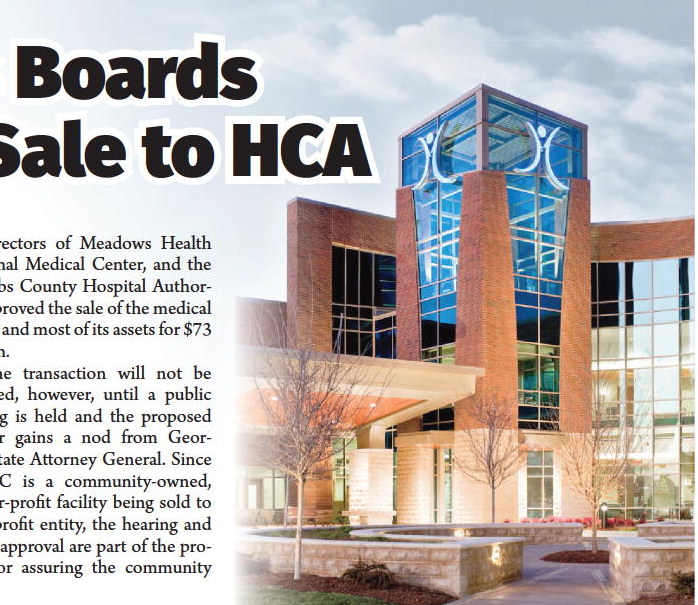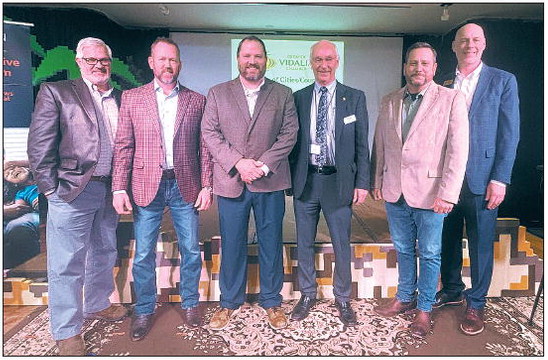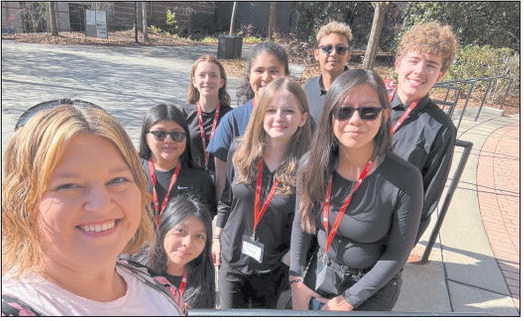Meadows Boards Approve Sale to HCA


Almost a year and half after preliminary negotiations began, the acquisition of Vidalia’s Meadows Health by Hospital Corporation of America (HCA) is moving toward completion. The deal is expected to be closed on or before April 30. Meadows Health Alliance, Inc., (MHA) the parent company of Meadows Regional Medical Center, signed a letter of intent for a merger with HCA in September 2019. Last week MHA, the Board of Directors of Meadows Health Regional Medical Center, and the Toombs County Hospital Authority approved the sale of the medical center and most of its assets for $73 million.
The transaction will not be finalized, however, until a public hearing is held and the proposed merger gains a nod from Georgia’s State Attorney General. Since MRMC is a community-owned, not-for-profit facility being sold to a for-profit entity, the hearing and state’s approval are part of the process for assuring the community continued from page
that the transaction is being handled in a fair and transparent way, said MRMC CEO Alan Kent. The public hearing is expected to occur in March.
The strategic alliance with HCA could not come at a more opportune time, Kent said. “Stand-alone community hospitals are finding it more difficult to survive in today’s health care environment. That pressure has only increased with the COVID pandemic. With HCA we become part of one of the most efficient, highest-quality health care systems in the country.”
HCA owns over 180 health care facilities nationwide and employs over 250,000 people. “Locally, we will have access to their technology, their latest systems of information and their expertise in patient care management. We will also have the resources to be able to invest in technology, employees and the community,” Kent added. “It is the difference between being a $130 million company and a $50 billion company. There are so many excellent resources that will come in the form of new facilities, the ability to recruit doctors, and other resources far beyond the capacity of a local, comparatively small, business to do.”
Mike Calhoun, MRMC board chair, noted, “We think it is the best thing to do for the long term. This strategic alliance insures that the citizens of Toombs and surrounding areas will have a high-quality, stateof- the-art medical community and regional medical center for the future.”
Calhoun said preliminary discussions about the outlook of the regional medical center began in 2018. “The future of rural hospitals was not looking good. Health care costs were going up rapidly and revenues were going down. Payments were being reduced by insurance companies, Medicare and Medicaid, and there was the issue of caring for the indigent population,” he explained. “We considered at that time that Meadows was stable, the hospital was virtually new, and that maybe we needed to start looking for a strategic partner while we were still in a good position. You sell when you are up, not when you are down.”
Calhoun said that among the prospects for a merger was HCA, which responded favorably to Meadows’ initial inquiries. “From the start Meadows was the most interested. It fit into their strategy in this part of Georgia,” Calhoun said. HCA which owns medical facilities in Waycross, Dublin, Augusta and Macon, as well as Memorial Hospital in Savannah, a tertiary care facility to which Meadows has referred more complex medical cases for some time. “We figured that it was a matter of time before HCA came into this area and we would rather they come in as a strategic partner than as competition,” Calhoun observed.
“It was the biggest driver in picking HCA as a strategic partner,” Kent said of the network of HCA health care centers in this area. “We will have the opportunity to share resources and plan regional strategy,” Kent explained.
Kent noted that HCA has agreed to assume the hospital’s existing HUD debt of $52.8 million in its entirety. Net proceeds after the assumption of the debt are expected to be $30 million. These funds will be managed by a newly-created Meadows Foundation, a not-for-profit organization that will directly benefit the community. Kent said that $10.3 million will be placed in escrow against potential future liabilities. In addition to the purchase price, HCA has committed to capital expenditures of at least $10 million over the five-year period following closing.
Some of Meadows assets are not included in the acquisition: the Thompson property adjacent to Meadows Park, 22 acres east of the hospital currently under option to the Toombs County Development Authority, and the Sweet Onion Hospitality House.
As a for-profit stock corporation whose shares are traded on the New York Stock Exchange, HCA will pay income, sales and local property taxes, which was not the case with the tax-exempt, not-for-profit MRMC, Kent pointed out. “HCA is expected to generate significant tax revenue which will benefit the local governments and schools,” Kent emphasized.
HCA will establish an advisory board whose purpose is to fulfill any governance accreditation requirement of the hospital such as reviewing annual budgets, capital plans, provider credentialing, and overseeing HCA’s covenants relating to community benefit provided in the purchase agreements. The advisory board will initially be composed of three individuals from the community appointed by Meadows and three individuals appointed by HCA.
HCA has agreed to maintain core services for a period of 10 years (with some conditions) and has guaranteed to preserve and enhance high-quality healthcare services in Toombs County and the surrounding areas. Meadows Cancer Center, the Interventional Cardiology Program and the Obstetrics Program will be continued by HCA, Kent said.
HCA has a policy to serve Medicaid and indigent patient populations that includes providing free, non-elective care for uninsured patients whose income is less than 200% of the Federal Poverty Level (FPL), with a tiered approach up to 400% of the FPL. This policy is more extensive than MRMC’s, Kent said.
Kent explained that HCA will offer employment to all Meadows employees who are in good standing as of the closing of the proposed transaction at current salary levels and with similar job titles and responsibilities. HCA will not terminate employees without cause for one year following the closing except in the event of a further COVID-related resurgence. HCA has the ability to flex the number of hours worked by hourly paid employees.
Kent said this point is meant to guarantee the stability of the staff. “They will be in the same or similar jobs at the same salary. It’s just a way of saying, ‘Everybody relax. We’ve got a hospital to run.’” He added that being an HCA employee offers employees the opportunity for upward mobility and growth within the HCA organization.
Meadows employees will transition to HCA benefit plans with recognition and credit for tenure at Meadows and participation in all plans on day one without regard to any preexisting health conditions with respect to the health and disability plans. Contracts for all physicians now under contract at Meadows will be immediately extended by HCA.
HCA and Meadows use the same clinical platform (Meditech) which is beneficial because HCA has a depth of knowledge and experience with Meditech and the clinical staff will not need to learn a new clinical platform, Kent advised. Additionally, Meadows will be integrated into all other HCA systems and industry-leading technologies.
Kent said it is likely that HCA will modify the name of the Vidalia medical facility, but there are hopes that “Meadows” will be retained and incorporated into the new HCA title. “We have been Meadows since 1963. It would be a shame to have that go away,” Kent said. HCA has demonstrated a tendency to honor communities and to incorporate the legacy names of medical facilities where it has purchased properties. A case in point is the hospital in Waycross where the facility’s historic name, “Memorial,” was used in the new HCA title. In commenting on the future of the current boards serving MRMC, Kent said these entities will have continuing responsibility to wind down the operation of MRMC over the next few years. “We still have to do final audits, income tax returns and cost reports to the federal government. These cost reports take three years or more for the government to audit and settle.” Kent said going forward it is likely that some of the boards will eventually be modified or merged. He said it is yet to be determined who will be serving on the new HCA board.
The inaugural board of the new Meadows Foundation will be made up of the five current members of the executive committee from the MRMC and the MHA boards. It will be the job of the Foundation board to manage the $30 million in proceeds from the sale of MRMC and to establish a foundation to serve the community. The operations of this self-perpetuating board will be defined and published. “This foundation will be a grant-making foundation. It will not make grants to individuals and it is not for indigent care since HCA will provide that. It is being established for the community’s benefit and possible uses might be for health education and community wellness,” Kent said. This Foundation is expected to be put into place quickly, perhaps in the next 60 days.
Calhoun elaborated, “It will be a supporting entity and probably have an executive director at some point.” The Foundation will not create programs on its own but will receive grant applications from organizations and groups within the community. Calhoun, who has been on the MRMC board since the 1990s, said the alliance with HCA seems like a natural fit. He thinks the relationship between the Vidalia facility and Memorial Hospital in Savannah will strengthen because both facilities will be within the HCA organization. He said of HCA, “They have financial capital; they can buy in bulk and get discounts we can’t. They can negotiate contracts with insurance companies, Medicaid and Medicare from a leverage standpoint that we don’t have. Their financial power allows them to be profitable where independent rural hospitals cannot.”
He added, “Back in 2018 I was losing sleep about the future of our hospital. Since we linked up with HCA, I don’t lose sleep. I feel as good about this decision as any.” He said about the impending changes, “HCA is sending a representative here next week to help begin the transition. They are committed to it.”
Wayne Williams, M.D., who is a member of the holding board for MRMC and who has maintained a local ENT practice for 14 years, said the community already has an impressive range and level of medical specialties rare for a community the size of Vidalia. “HCA can insure the continuation of a high quality of care we are enjoying in this area. HCA will increase local access and purchasing power and open doors to other systems we don’t have right now. HCA will allow us to advance. I would worry about the viability of our hospital without the help of a partner like HCA.”





